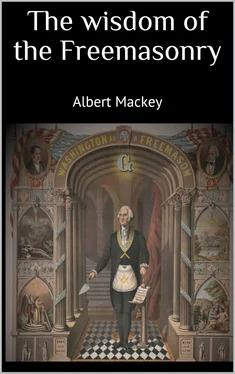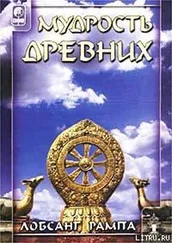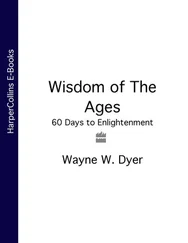Albert Mackey - The wisdom of the Freemasonry
Здесь есть возможность читать онлайн «Albert Mackey - The wisdom of the Freemasonry» — ознакомительный отрывок электронной книги совершенно бесплатно, а после прочтения отрывка купить полную версию. В некоторых случаях можно слушать аудио, скачать через торрент в формате fb2 и присутствует краткое содержание. Жанр: unrecognised, на английском языке. Описание произведения, (предисловие) а так же отзывы посетителей доступны на портале библиотеки ЛибКат.
- Название:The wisdom of the Freemasonry
- Автор:
- Жанр:
- Год:неизвестен
- ISBN:нет данных
- Рейтинг книги:4 / 5. Голосов: 1
-
Избранное:Добавить в избранное
- Отзывы:
-
Ваша оценка:
- 80
- 1
- 2
- 3
- 4
- 5
The wisdom of the Freemasonry: краткое содержание, описание и аннотация
Предлагаем к чтению аннотацию, описание, краткое содержание или предисловие (зависит от того, что написал сам автор книги «The wisdom of the Freemasonry»). Если вы не нашли необходимую информацию о книге — напишите в комментариях, мы постараемся отыскать её.
The wisdom of the Freemasonry — читать онлайн ознакомительный отрывок
Ниже представлен текст книги, разбитый по страницам. Система сохранения места последней прочитанной страницы, позволяет с удобством читать онлайн бесплатно книгу «The wisdom of the Freemasonry», без необходимости каждый раз заново искать на чём Вы остановились. Поставьте закладку, и сможете в любой момент перейти на страницу, на которой закончили чтение.
Интервал:
Закладка:
VII. The Union of Speculative and Operative Masonry at the Temple of Solomon.
Thus, then, we arrive at another important epoch in the history of the origin of Freemasonry.
I have shown how the Primitive Freemasonry, originating in this new world; with Noah, was handed down to his descendants as a purely speculative institution, embracing certain traditions of the nature of God and of the soul. I have shown how, soon after the deluge, the descendants of Noah separated, one portion, losing their traditions, and substituting in their place idolatrous and polytheistic religions, while the other and smaller portion retained and communicated those original traditions under the name of the Primitive Freemasonry of antiquity. I have shown how, among the polytheistic nations, there were a few persons who still had a dim and clouded understanding of these traditions, and that they taught them in certain secret institutions, known as the "Mysteries," thus establishing another branch of the speculative science which is known under the name of the Spurious Freemasonry of antiquity. Again, I have shown how one sect or division of these Spurious Freemasons existed at Tyre about the time of the building of King Solomon's temple, and added to their speculative science, which was much purer than that of their contemporary Gentile mystics, the practice of the arts of architecture and sculpture, under the name of the Dionysiac Fraternity of Artificers. And, lastly, I have shown how, at the building of the Solomonic temple, on the invitation of the king of Israel, a large body of these architects repaired from Tyre to Jerusalem, organized a new institution, or, rather, a modification of the two old ones, the Primitive Freemasons among the Israelites yielding something, and the Spurious Freemasons among the Tyrians yielding more; the former purifying the speculative science, and the latter introducing the operative art, together with the mystical ceremonies with which they accompanied its administration. It is at this epoch, then, that I place the first union of speculative and operative Masonry,--a union which continued uninterruptedly to exist until a comparatively recent period, to which I shall have occasion hereafter briefly to advert. The other branches of the Spurious Freemasonry were not, however, altogether and at once abolished by this union, but continued also to exist and teach their half-truthful dogmas, for ages after, with interrupted success and diminished influence, until, in the fifth century of the Christian era, the whole of them were proscribed by the Emperor Theodosius. From time to time, however, other partial unions took place, as in the instance of Pythagoras, who, originally a member of the school of Spurious Freemasonry, was, during his visit to Babylon, about four hundred and fifty years after the union at the temple of Jerusalem, initiated by the captive Israelites into the rites of Temple Masonry, whence the instructions of that sage approximate much more nearly to the principles of Freemasonry, both in spirit and in letter, than those of any other of the philosophers of antiquity; for which reason he is familiarly called, in the modern masonic lectures, "an ancient friend and brother," and an important symbol of the order, the forty-seventh problem of Euclid, has been consecrated to his memory. I do not now propose to enter upon so extensive a task as to trace the history of the institution from the completion of the first temple to its destruction by Nebuchadnezzar; through the seventy-two years of Babylonish captivity to the rebuilding of the second temple by Zerubbabel; thence to the devastation of Jerusalem by Titus, when it was first introduced into Europe; through all its struggles in the middle ages, sometimes protected and sometimes persecuted by the church, sometimes forbidden by the law and oftener encouraged by the monarch; until, in the beginning of the sixteenth century, it assumed its present organization. The details would require more time for their recapitulation than the limits of the present work will permit. But my object is not so much to give a connected history of the progress of Freemasonry as to present a rational view of its origin and an examination of those important modifications which, from time to time, were impressed upon it by external influences, so as to enable us the more readily to appreciate the true character and design of its symbolism. Two salient points, at least, in its subsequent history, especially invite attention, because they have an important bearing on its organization, as a combined speculative and operative institution.
VIII. The Travelling Freemasons of the Middle Ages.
The first of these points to which I refer is the establishment of a body of architects, widely disseminated throughout Europe during the middle ages under the avowed name of Travelling Freemasons. This association of workmen, said to have been the descendants of the Temple Masons, may be traced by the massive monuments of their skill at as early a period as the ninth or tenth century; although, according to the authority of Mr. Hope, who has written elaborately on the subject, some historians have found the evidence of their existence in the seventh century, and have traced a peculiar masonic language in the reigns of Charlemagne of France and Alfred of England.
It is to these men, to their preeminent skill in architecture, and to their well-organized system as a class of workmen, that the world is indebted for those magnificent edifices which sprang up in such undeviating principles of architectural form during the middle ages. "Wherever they came," says Mr. Hope, "in the suite of missionaries, or were called by the natives, or arrived of their own accord, to seek employment, they appeared headed by a chief surveyor, who governed the whole troop, and named one man out of every ten, under the name of warden, to overlook the nine others, set themselves to building temporary huts 35 for their habitation around the spot where the work was to be carried on, regularly organized their different departments, fell to work, sent for fresh supplies of their brethren as the object demanded, and, when all was finished, again raised their encampment, and went elsewhere to undertake other jobs." 36 This society continued to preserve the commingled features of operative and speculative masonry, as they had been practised at the temple of Solomon. Admission to the community was not restricted to professional artisans, but men of eminence, and particularly ecclesiastics, were numbered among its members. "These latter," says Mr. Hope, "were especially anxious, themselves, to direct the improvement and erection of their churches and monasteries, and to manage the expenses of their buildings, and became members of an establishment which had so high and sacred a destination, was so entirely exempt from all local, civil jurisdiction, acknowledged the pope alone as its direct chief, and only worked under his immediate authority; and thence we read of so many ecclesiastics of the highest rank--abbots, prelates, bishops--conferring additional weight and respectability on the order of Freemasonry by becoming its members--themselves giving the designs and superintending the construction of their churches, and employing the manual labor of their own monks in the edification of them." Thus in England, in the tenth century, the Masons are said to have received the special protection of King Athelstan; in the eleventh century, Edward the Confessor declared himself their patron; and in the twelfth, Henry I. gave them his protection. Into Scotland the Freemasons penetrated as early as the beginning of the twelfth century, and erected the Abbey of Kilwinning, which afterwards became the cradle of Scottish Masonry under the government of King Robert Bruce. Of the magnificent edifices which they erected, and of their exalted condition under both ecclesiastical and lay patronage in other countries, it is not necessary to give a minute detail. It is sufficient to say that in every part of Europe evidences are to be found of the existence of Freemasonry, practised by an organized body of workmen, and with whom men of learning were united; or, in other words, of a combined operative and speculative institution. What the nature of this speculative science continued to be, we may learn from that very curious, if authentic, document, dated at Cologne, in the year 1535, and hence designated as the "Charter of Cologne." In that instrument, which purports to have been issued by the heads of the order in nineteen different and important cities of Europe, and is addressed to their brethren as a defence against the calumnies of their enemies, it is announced that the order took its origin at a time "when a few adepts, distinguished by their life, their moral doctrine, and their sacred interpretation of the arcanic truths, withdrew themselves from the multitude in order more effectually to preserve uncontaminated the moral precepts of that religion which is implanted in the mind of man." We thus, then, have before us an aspect of Freemasonry as it existed in the middle ages, when it presents itself to our view as both operative and speculative in its character. The operative element that had been infused into it by the Dionysiac artificers of Tyre, at the building of the Solomonic temple, was not yet dissevered from the pure speculative element which had prevailed in it anterior to that period.
Читать дальшеИнтервал:
Закладка:
Похожие книги на «The wisdom of the Freemasonry»
Представляем Вашему вниманию похожие книги на «The wisdom of the Freemasonry» списком для выбора. Мы отобрали схожую по названию и смыслу литературу в надежде предоставить читателям больше вариантов отыскать новые, интересные, ещё непрочитанные произведения.
Обсуждение, отзывы о книге «The wisdom of the Freemasonry» и просто собственные мнения читателей. Оставьте ваши комментарии, напишите, что Вы думаете о произведении, его смысле или главных героях. Укажите что конкретно понравилось, а что нет, и почему Вы так считаете.












